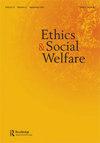从经验到文本:民族志社会工作研究中的表现、揭露与理解问题
IF 0.9
Q4 SOCIAL WORK
引用次数: 0
摘要
摘要本文从研究人员结束数据收集、开始分析材料和构建论文叙事时出现的伦理困境入手。这是研究主题可能变得客观化的时刻。尽管这是一个公认的困境,但本文的目的是将其与社会工作中的民族志研究联系起来,以进一步发展这种“旧”困境的某些方面。在分析不同社会工作环境中的两个民族志观察时,使用了三篇关于表征、披露和理解主题的突出文本。一个结论是,民族志研究者在社会工作中面临的主要挑战是,他们经常同时写处于不平等地位的人。等级制度和权力关系必须成为如何在不客观化的情况下写作的问题的一部分。这一事实使研究人员处于模棱两可的境地,因为他们的行为是双方的,包括那些处于特权地位的人和那些被视为弱势群体的人。因此,伦理困境不仅包括研究者与研究主体之间的关系,还包括处于不同权力地位的研究主体间的党际关系。本文章由计算机程序翻译,如有差异,请以英文原文为准。
From Experience to Text: Issues of Representation, Disclosure, and Understanding in Ethnographic Social Work Research
ABSTRACT This paper starts with the ethical dilemma that appears when researchers end data collection, start to analyse the material, and construct the narrative of the thesis. This is the moment when the research subject might become objectified. Although this is a well-recognised dilemma, the aim of this paper is to investigate this in relation to ethnographic studies in social work in order to further develop some aspects of this ‘old’ dilemma. Three prominent texts on the topics of representation, disclosure, and understanding are used in an analysis of two ethnographic observations in different social work settings. A conclusion is that the main challenge for the ethnographic researcher in social work is the fact that they often write concurrently about people in unequal positions. Hierarchies and power relations have to be part of the question about how to write without objectifying. This fact places the researcher in a position of ambiguity because they act on both sides, including both those who are in privileged positions and those who are considered vulnerable groups. Hence, the ethical dilemma not only includes the relation between the researcher and the research subject, but also inter-party relations between research subjects in different power positions.
求助全文
通过发布文献求助,成功后即可免费获取论文全文。
去求助
来源期刊

Ethics and Social Welfare
SOCIAL WORK-
CiteScore
1.60
自引率
20.00%
发文量
36
期刊介绍:
Ethics and Social Welfare publishes articles of a critical and reflective nature concerned with the ethical issues surrounding social welfare practice and policy. It has a particular focus on social work (including practice with individuals, families and small groups), social care, youth and community work and related professions. The aim of the journal is to encourage dialogue and debate across social, intercultural and international boundaries on the serious ethical issues relating to professional interventions into social life. Through this we hope to contribute towards deepening understandings and further ethical practice in the field of social welfare. The journal welcomes material in a variety of formats, including high quality peer-reviewed academic papers, reflections, debates and commentaries on policy and practice, book reviews and review articles. We actively encourage a diverse range of contributions from academic and field practitioners, voluntary workers, service users, carers and people bringing the perspectives of oppressed groups. Contributions might include reports on research studies on the influence of values and ethics in social welfare practice, education and organisational structures, theoretical papers discussing the evolution of social welfare values and ethics, linked to contemporary philosophical, social and ethical thought, accounts of ethical issues, problems and dilemmas in practice, and reflections on the ethics and values of policy and organisational development. The journal aims for the highest standards in its published material. All material submitted to the journal is subject to a process of assessment and evaluation through the Editors and through peer review.
 求助内容:
求助内容: 应助结果提醒方式:
应助结果提醒方式:


